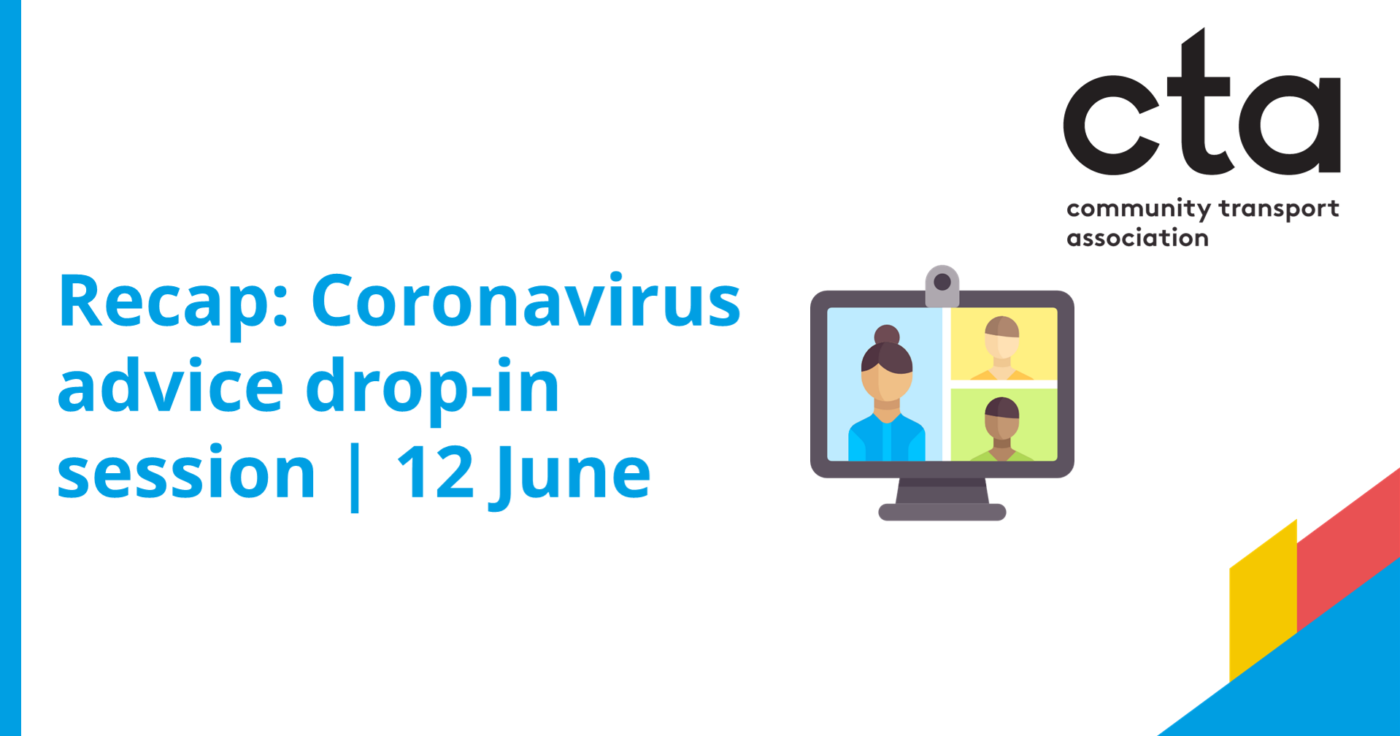-

Recap: Coronavirus Advice Drop-in Session 12 June
-
19th June 2020
-
-
by Dylan Gallanders
Support and Engagement Executive, North Wales
As the situation around coronavirus, develops we want to make sure that our members can access the guidance they need to understand any actions or precautions they might need to take. We’re regularly publishing and updating important guidance for the community transport sector which you can find on our main guidance page at ctauk.org/covid19-guidance/.
As well as this, you can also contact the CTA advice service if you need any further information, or have any more questions. The CTA team are currently working remotely, so to ensure you speak to the right person first time, please email advice@ctauk.org to receive a call back for advice and support. Our advice service operates 10:00-4:00 Monday-Friday.
Our weekly advice service drop-ins
To help support our members throughout this difficult time, we’re also holding an ‘Advice Service Drop-in’ on a weekly basis. This is an opportunity for you to share how you are being affected by the situation, to ask any questions you may have and to talk to other members about how they’re coping. Whilst we may not have all the answers, we will continue to seek clarity and guidance from the relevant bodies on your behalf and these conversations will inform what we’re doing at CTA to support you.
For those unable to make it, we will be sharing a summary of the points that are discussed during the sessions, including any best-practice or advice from other CTA members that they share during the call.
Last week’s call
Much of last week’s call focused on the new regulations in England which require passengers to wear a face covering on public transport from 15th June. The Government guidance for transport operators has been updated to reflect the new rules. As these regulations include buses, this will be a requirement for those operating community transport services under a Section 22 permit. The requirements do not apply to:
- School transport services (children under the age of 11 are exempt in all circumstances).
- Taxi or private hire vehicles – although a taxi driver or private hire vehicle operator may refuse to accept passengers if they do not wear a face covering.
- Stations.
- Stops.
- Interchanges.
The new rules do not extend to car schemes or those operating under a Section 19 permit; however, it is strongly advised that the same guidelines are followed. There are also circumstances where a passenger may be exempt from the requirements due to a reasonable excuse, which may include:
- Where they cannot put on, wear, or remove a face covering without severe distress or because of any physical or mental illness or impairment, or disability (within the meaning of section 6 of the Equality Act 2010).
- Where they are travelling with, or providing assistance to, another person who relies on lip reading to communicate.
- Where they remove the face covering to avoid harm or injury, or the risk of harm or injury, to themselves or others.
- Where they are travelling to avoid injury, or to escape a risk of harm, and do not have a face covering with them.
- To eat or drink where it is reasonably necessary to do so.
- Where they have to remove their face covering to take medication.
- Where they are requested to remove the face covering by a constable or other relevant person.
The mandatory requirements do not require staff to wear a face covering. However, the guidance highlights that face coverings offer some benefits in situations where social distancing is difficult to manage, such as when working in passenger facing roles. How you translate this guidance into a policy for your drivers and passenger assistants should be informed by a risk assessment.
In Scotland, although face coverings have not been made mandatory, passengers are expected to wear them when travelling. Similarly, in Wales and Northern Ireland, face coverings are recommended but are not compulsory.
What is a face covering?
It is important to note that a face covering is not the same as the surgical masks or respirators used by healthcare workers as part of their personal protective equipment. A face covering covers a person’s nose and mouth and can be as simple as a scarf or bandana that ties behind the head. There are useful guides online which show you how a face covering can be made at home. They are now also becoming more commonly available in local shops and supermarkets.
Some members on the call said that they will provide passengers with a face covering when they first start travelling which they will then be expected to wash and reuse. It was also suggested that face coverings could be provided for a small donation. Members have also been able to source face coverings from volunteers in their community who have been making them at home and donating them.
There is a useful video guide on using face coverings from the BBC, here.
Our next call
Our next advice drop-in calls is taking place on Friday 19 June from 11:00-12:00. If you would like to join, please email advice@ctauk.org with the subject line ‘Covid-19 weekly drop-in’.
As ever, you can find our latest coronavirus guidance at ctauk.org/covid19-guidance/and, if you need advice or support on this or anything else, or if you have any ideas for topics you want to be discussed at future drop-ins, please don’t hesitate to get in touch.
-
